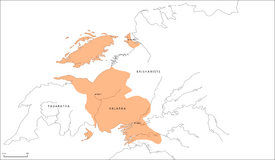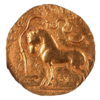Valarna Council Republic
Valarna Council Republic | |||||||||||
|---|---|---|---|---|---|---|---|---|---|---|---|
 | |||||||||||
| Capital |
| ||||||||||
• 1946-1950 | Dinesh Satyadeva | ||||||||||
• 1950-1952 | Arnav Basak | ||||||||||
• 1955-1960 | Lochan Borah | ||||||||||
• 1960 | Bhavana Soni | ||||||||||
| Historical era | Post-Colonial Satria | ||||||||||
| |||||||||||
The Valarna Council Republic, sometimes called just Valarna and self identifying as Satria, was a revolutionary state in west central Satria from 1946 to 1960 CE. Valarna was formed by a coalition of unions, most prominently the Iron and Mineral Federation of Bogura (later broadened to all of Satria as the IKSS) and their president Dinesh Satyadeva. The Bogura region had already hosted several attempts at unionization (illegal under Satrian occupation), later revolts prior to 1946, and was seen as a stronghold of anti-colonial forces as early as 1915. The unionist militias were some of the first to seize Etrurian assets during the Coian Evacuation and was ideologically committed to a single Satrian state. From 1946 to 1952, Valarna formed local militias in the Satrian highlands to help establish a new state and fill the power vacuum left by a largely disorganized Etrurian retreat. From the beginning, the state was plagued by regionalism and struggled to organizea coherent councilist doctrine for Satria, focusing primarily on expanding as rapidly as possible. Opponents to councilism were already well established, especially among Etrurian collaborators who had amassed many industrial assets. As these unfriendly figures were targeted by Satyadeva's central government in political purges that alienated many of the key regional warlords and militias Valarna had created to project authority as far as possible.
In the winter of 1951-1952 Satyadeva ordered the arrest of 17 members of the Pinjar Commandery for refusing to commit resources to his planned invasion of Padaratha, immediately triggering reciprocal orders from his opponents; he was assassinated by an unidentified assailant in 1950 while travelling towards Pinjar with an armed force. After his death, anti-Councilst forces moved quickly towards the provisional capital at Bogura. Councilst forces retreated first to Chaboksar and later Chandipur, relying heavily on naval support to protect coastal emplacements. Eventually confined to Chandipur with independent and disorganized supporters on the Bashurat plain, Arnav Basak was selected president. Under Basak's leadership, Valarna's forces were committed primarly to coastal raids, which helped prevent the anti-Councilists from coalescing into a meaningful force capable of assaulting Chandipur. Despite this setback, the anti-Councilsts felt that they were winning the war and became concerned with the formation of a post-war government. Prominent warlords of various ideological backgrounds began to conserve forces to purge their own opponents; there was a notable split between right-wing militarists and the Sanyukt loyalists/rehabilitated collaborators, but personal politics were the dominant factor in loyalties at the time.
